虚拟语气的倒装形式
- 格式:docx
- 大小:12.90 KB
- 文档页数:1
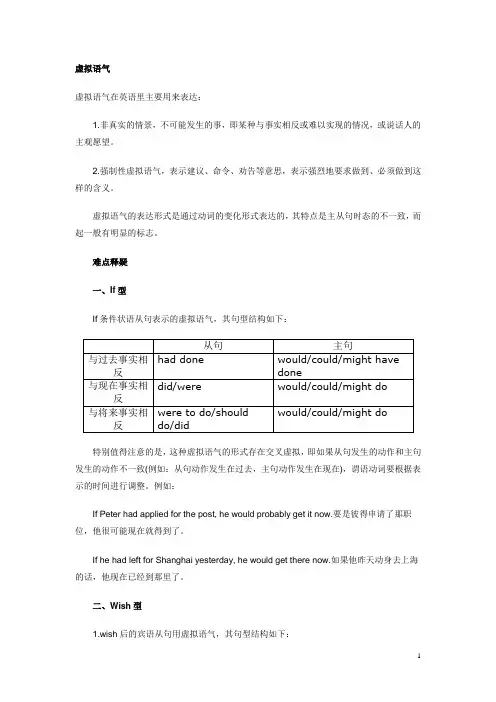
虚拟语气虚拟语气在英语里主要用来表达:1.非真实的情景,不可能发生的事,即某种与事实相反或难以实现的情况,或说话人的主观愿望。
2.强制性虚拟语气,表示建议、命令、劝告等意思,表示强烈地要求做到、必须做到这样的含义。
虚拟语气的表达形式是通过动词的变化形式表达的,其特点是主从句时态的不一致,而起一般有明显的标志。
难点释疑一、If型If条件状语从句表示的虚拟语气,其句型结构如下:特别值得注意的是,这种虚拟语气的形式存在交叉虚拟,即如果从句发生的动作和主句发生的动作不一致(例如:从句动作发生在过去,主句动作发生在现在),谓语动词要根据表示的时间进行调整。
例如:If Peter had applied for the post, he would probably get it now.要是彼得申请了那职位,他很可能现在就得到了。
If he had left for Shanghai yesterday, he would get there now.如果他昨天动身去上海的话,他现在已经到那里了。
二、Wish型1.wish后的宾语从句用虚拟语气,其句型结构如下:与过去事实相反wish that 从句的谓语动词用had done与现在事实相反wish that 从句的谓语动词用did与将来事实相反wish that 从句的谓语动词用would/could do例如:I wish they would change the menu.他们要是改变一下菜单就好了。
I wish I hadn’t spent so much money.我要是没花那么多的钱就好了。
同样地,在as if/as though引导的宾语从句中和以if only引导的带有感叹色彩的虚拟语气句子中,谓语动词与wish引导的宾语从句中的虚拟形式相同。
2.由if only 引导的虚拟语气与过去事实相反if only 谓语动词用had done与现在事实相反if only 谓语动词用did例如:If only she had asked someone’s advice! 她要是征求了别人的意见就好了!3.由as if/as though 引导的虚拟语气与过去事实相反as if/as though谓语动词用had done与现在事实相反as if/as though谓语动词用did例如:He talks about Rome as if he had been there himself.谈论起罗马来就像他去过似的。
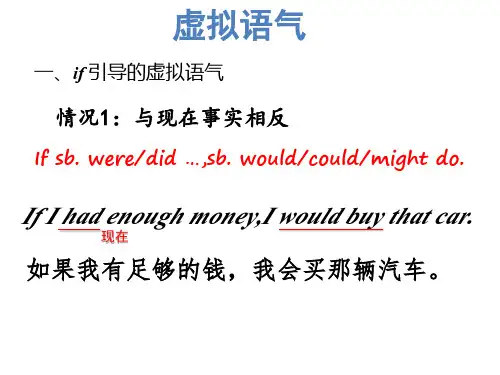
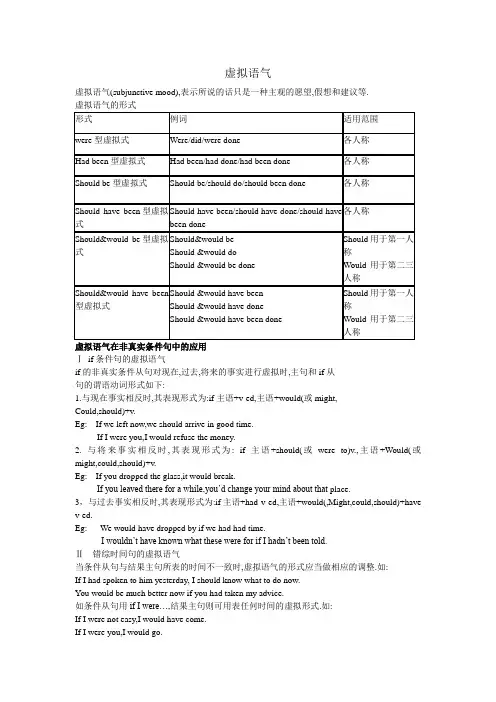
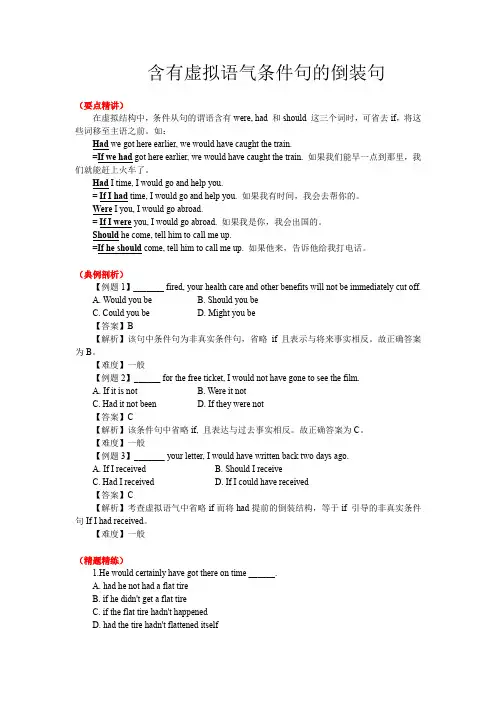
含有虚拟语气条件句的倒装句(要点精讲)在虚拟结构中,条件从句的谓语含有were, had 和should 这三个词时,可省去if,将这些词移至主语之前。
如:Had we got here earlier, we would have caught the train.=If we had got here earlier, we would have caught the train. 如果我们能早一点到那里,我们就能赶上火车了。
Had I time, I would go and help you.= If I had time, I would go and help you. 如果我有时间,我会去帮你的。
Were I you, I would go abroad.= If I were you, I would go abroad. 如果我是你,我会出国的。
Should he come, tell him to call me up.=If he should come, tell him to call me up. 如果他来,告诉他给我打电话。
(典例剖析)【例题1】_______ fired, your health care and other benefits will not be immediately cut off.A. Would you beB. Should you beC. Could you beD. Might you be【答案】B【解析】该句中条件句为非真实条件句,省略if且表示与将来事实相反。
故正确答案为B。
【难度】一般【例题2】______ for the free ticket, I would not have gone to see the film.A. If it is notB. Were it notC. Had it not beenD. If they were not【答案】C【解析】该条件句中省略if, 且表达与过去事实相反。
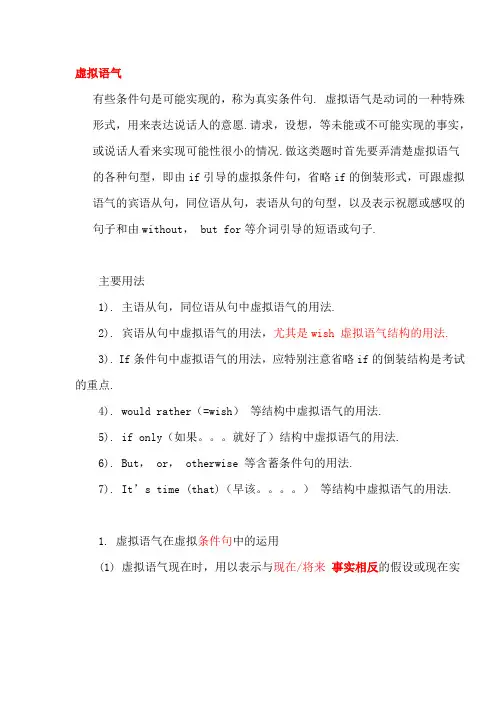
虚拟语气有些条件句是可能实现的,称为真实条件句. 虚拟语气是动词的一种特殊形式,用来表达说话人的意愿.请求,设想,等未能或不可能实现的事实,或说话人看来实现可能性很小的情况.做这类题时首先要弄清楚虚拟语气的各种句型,即由if引导的虚拟条件句,省略if的倒装形式,可跟虚拟语气的宾语从句,同位语从句,表语从句的句型,以及表示祝愿或感叹的句子和由without, but for等介词引导的短语或句子.主要用法1). 主语从句,同位语从句中虚拟语气的用法.2). 宾语从句中虚拟语气的用法,尤其是wish 虚拟语气结构的用法.3). If条件句中虚拟语气的用法,应特别注意省略if的倒装结构是考试的重点.4). would rather(=wish)等结构中虚拟语气的用法.5). if only(如果。
就好了)结构中虚拟语气的用法.6). But, or, otherwise 等含蓄条件句的用法.7). It’s time (that)(早该。
)等结构中虚拟语气的用法.1. 虚拟语气在虚拟条件句中的运用(1) 虚拟语气现在时,用以表示与现在/将来事实相反的假设或现在实现可能性不大的情况.Eg. If I were a bird, I would fly to you.If it is not for their help, we shall be in a very difficult position.If it were not for their help, we should be in a very difficult position.If I had seen the film, I would…..(2) 虚拟语气过去式. 表示与过去事实完全相反的假设.Eg. If we had started earlier, we should not have missed the train.If she hadn’t been ill, she might have come.If she were not ill, she might come.◆书面语中,如果从句里含有should, had, were或其他助动词,则可将从属连词if省去,将助动词.情态动词.be或have放在句首形成部分倒装.Eg.Were he in your position,he’d do the same.If he Were in your position,he’d do the same.Had I had time, I would have done that yesterday.If I Had had time, I would have done that yesterday.If he Should (万一)come tomorrow, I should give him the dictionary.(3) 虚拟语气在某些从句中的应用.A)在(表现了说话人的愿望)wish, suggest, order, demand, propose,command, request, recommend, require, decide, insist, desire,urge等动词的宾语从句(should:应该) + 动词原形.以及would rather /sooner that后要用“ (should:应该) + 动词原形” 来表示愿望,建议,命令,要求等;由上述动词派生或转化的名词suggestion, proposal, plan,motion, recommendation, demand, order, desire, request,requirement, insistence, advice, decision , obligatory(义不容辞的,必须的同位语从句或表语从句中也要用相应的虚拟形式.Eg. His suggestion was that we (should) go at once.Wang insisted that we go at once.B)在It is/was + 某些形容词 + that (表现了说话人的愿望)从句的句型中,that从句中的谓语动词常用虚拟语气,即“should + 动词原形”这些形容词有:important, necessary, essential, imperative, natural, strange,advisable, desirable, possible, probable, astonishing,surprising, desired, suggested, requested, recommended,ordered, proposed, decided, moved等.C) “ should(居然/竟然) + 动词原形(或完成形式)” 可表示惊奇,遗憾,怀疑,不满等.ⅰ. 用于expect, believe, think, suspect 等动词的否定或疑问形式后的宾语从句中.Eg. I never expected that the new apartment should be so small.ⅱ. 用于“It is a pity, it is a shame, it is no wonder 等+ that”等结构后的主语从句中.Eg. It is a pity that he should be so careless.D) 在由for fear that, in case, lest 等引导的状语从句中,用“ should (万一)+ 动词原形” 表示“惟恐”的意思.Eg. He handled the instrument with care for fear that it should be damaged.E) 在“ It is (about/ high ) time + that (从句)(早就应该)” 中,谓语动词常用过去式表表示虚拟语气.Eg. It is high time that Chinese people learnt English.F) 在“as if/ as though”(似乎/好像) 引导的状语从句中,谓语动词与wish的宾语从句的虚拟形式相同.Eg. He w ork s with such enthusiasm as if he never knew fatigue. He speaks English as though he were an American.G) 在 look/sound/feel/ seem + as if / as though从句中,当表示真实情况时,用陈述语气; 否则,用虚拟语气.Eg.It seems as if they know each other. (真实情况)It seems as if they knew each other.It seems as though it were already spring. (虚拟语气)H) 用在if only(如果。
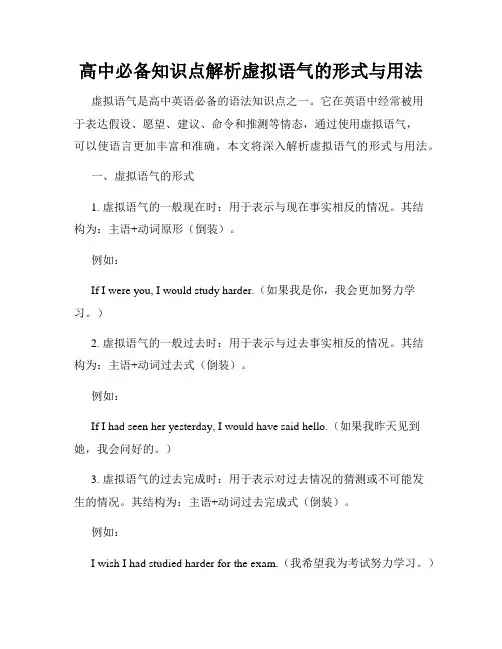
高中必备知识点解析虚拟语气的形式与用法虚拟语气是高中英语必备的语法知识点之一。
它在英语中经常被用于表达假设、愿望、建议、命令和推测等情态,通过使用虚拟语气,可以使语言更加丰富和准确。
本文将深入解析虚拟语气的形式与用法。
一、虚拟语气的形式1. 虚拟语气的一般现在时:用于表示与现在事实相反的情况。
其结构为:主语+动词原形(倒装)。
例如:If I were you, I would study harder.(如果我是你,我会更加努力学习。
)2. 虚拟语气的一般过去时:用于表示与过去事实相反的情况。
其结构为:主语+动词过去式(倒装)。
例如:If I had seen her yesterday, I would have said hello.(如果我昨天见到她,我会问好的。
)3. 虚拟语气的过去完成时:用于表示对过去情况的猜测或不可能发生的情况。
其结构为:主语+动词过去完成式(倒装)。
例如:I wish I had studied harder for the exam.(我希望我为考试努力学习。
)二、虚拟语气的用法1. 表达假设与条件:If I were you, I would travel around the world.(如果我是你,我会环游世界。
)I wish I had a million dollars.(我希望我有一百万美元。
)2. 表达愿望与建议:I wish you would stop smoking.(我希望你戒烟。
)It's important that she arrive on time.(她按时到达很重要。
)3. 表达命令与要求:The teacher ordered that the students be quiet.(老师要求学生们保持安静。
)She insisted that he leave immediately.(她坚持要他立刻离开。
)4. 表达推测与猜测:He looks as if he were sick.(他看起来像是生病了。
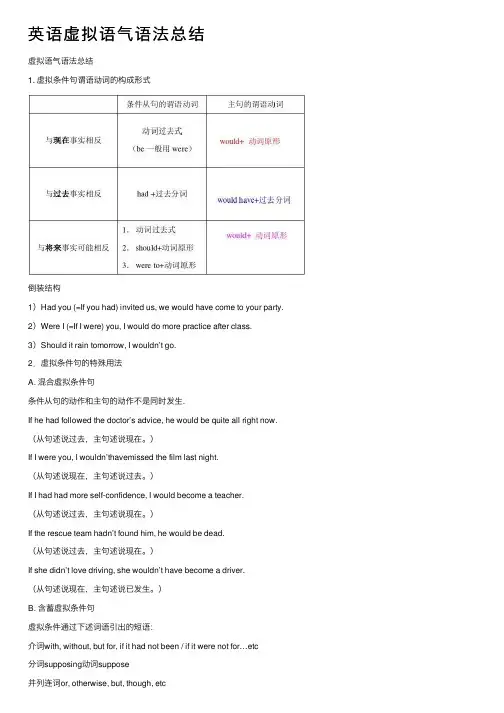
英语虚拟语⽓语法总结虚拟语⽓语法总结1. 虚拟条件句谓语动词的构成形式倒装结构1)Had you (=If you had) invited us, we would have come to your party. 2)Were I (=If I were) you, I would do more practice after class.3)Should it rain tomorrow, I wouldn’t go.2.虚拟条件句的特殊⽤法A. 混合虚拟条件句条件从句的动作和主句的动作不是同时发⽣.If he had followed the doctor’s advice, he would be quite all right now.(从句述说过去,主句述说现在。
)If I were you, I wouldn’thavemissed the film last night.(从句述说现在,主句述说过去。
)If I had had more self-confidence, I would become a teacher.(从句述说过去,主句述说现在。
)If the rescue team hadn’t found him, he would be dead.(从句述说过去,主句述说现在。
)If she didn’t love driving, she wouldn’t have become a driver.(从句述说现在,主句述说已发⽣。
)B. 含蓄虚拟条件句虚拟条件通过下述词语引出的短语:介词with, without, but for, if it had not been / if it were not for…etc例如:1)I couldn’t have won the competition without your encouragement.2)With your assistance (=If we had your assistance), we might finish the plan earlier3)Butfor you advice, I wouldnotbe able to do this work.4) Victor obviously doesn’t know what’s happened, otherwise he wouldn’thavemade such a stupid remark.C. 虚拟条件句中的表⽰结果的主句有时形式上可以省略,但意义上仍然存在。
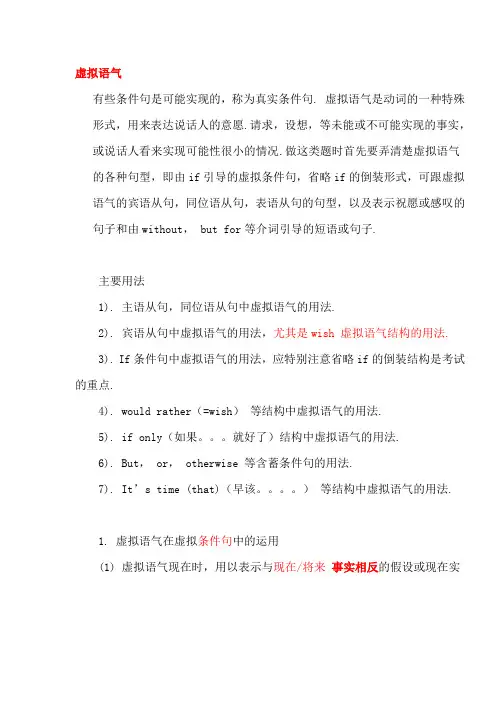
虚拟语气有些条件句是可能实现的,称为真实条件句. 虚拟语气是动词的一种特殊形式,用来表达说话人的意愿.请求,设想,等未能或不可能实现的事实,或说话人看来实现可能性很小的情况.做这类题时首先要弄清楚虚拟语气的各种句型,即由if引导的虚拟条件句,省略if的倒装形式,可跟虚拟语气的宾语从句,同位语从句,表语从句的句型,以及表示祝愿或感叹的句子和由without, but for等介词引导的短语或句子.主要用法1). 主语从句,同位语从句中虚拟语气的用法.2). 宾语从句中虚拟语气的用法,尤其是wish 虚拟语气结构的用法.3). If条件句中虚拟语气的用法,应特别注意省略if的倒装结构是考试的重点.4). would rather(=wish)等结构中虚拟语气的用法.5). if only(如果。
就好了)结构中虚拟语气的用法.6). But, or, otherwise 等含蓄条件句的用法.7). It’s time (that)(早该。
)等结构中虚拟语气的用法.1. 虚拟语气在虚拟条件句中的运用(1) 虚拟语气现在时,用以表示与现在/将来事实相反的假设或现在实现可能性不大的情况.Eg. If I were a bird, I would fly to you.If it is not for their help, we shall be in a very difficult position.If it were not for their help, we should be in a very difficult position.If I had seen the film, I would…..(2) 虚拟语气过去式. 表示与过去事实完全相反的假设.Eg. If we had started earlier, we should not have missed the train.If she hadn’t been ill, she might have come.If she were not ill, she might come.◆书面语中,如果从句里含有should, had, were或其他助动词,则可将从属连词if省去,将助动词.情态动词.be或have放在句首形成部分倒装.Eg.Were he in your position,he’d do the same.If he Were in your position,he’d do the same.Had I had time, I would have done that yesterday.If I Had had time, I would have done that yesterday.If he Should (万一)come tomorrow, I should give him the dictionary.(3) 虚拟语气在某些从句中的应用.A)在(表现了说话人的愿望)wish, suggest, order, demand, propose,command, request, recommend, require, decide, insist, desire,urge等动词的宾语从句(should:应该) + 动词原形.以及would rather /sooner that后要用“ (should:应该) + 动词原形” 来表示愿望,建议,命令,要求等;由上述动词派生或转化的名词suggestion, proposal, plan,motion, recommendation, demand, order, desire, request,requirement, insistence, advice, decision , obligatory(义不容辞的,必须的同位语从句或表语从句中也要用相应的虚拟形式.Eg. His suggestion was that we (should) go at once.Wang insisted that we go at once.B)在It is/was + 某些形容词 + that (表现了说话人的愿望)从句的句型中,that从句中的谓语动词常用虚拟语气,即“should + 动词原形”这些形容词有:important, necessary, essential, imperative, natural, strange,advisable, desirable, possible, probable, astonishing,surprising, desired, suggested, requested, recommended,ordered, proposed, decided, moved等.C) “ should(居然/竟然) + 动词原形(或完成形式)” 可表示惊奇,遗憾,怀疑,不满等.ⅰ. 用于expect, believe, think, suspect 等动词的否定或疑问形式后的宾语从句中.Eg. I never expected that the new apartment should be so small.ⅱ. 用于“It is a pity, it is a shame, it is no wonder 等+ that”等结构后的主语从句中.Eg. It is a pity that he should be so careless.D) 在由for fear that, in case, lest 等引导的状语从句中,用“ should (万一)+ 动词原形” 表示“惟恐”的意思.Eg. He handled the instrument with care for fear that it should be damaged.E) 在“ It is (about/ high ) time + that (从句)(早就应该)” 中,谓语动词常用过去式表表示虚拟语气.Eg. It is high time that Chinese people learnt English.F) 在“as if/ as though”(似乎/好像) 引导的状语从句中,谓语动词与wish的宾语从句的虚拟形式相同.Eg. He w ork s with such enthusiasm as if he never knew fatigue. He speaks English as though he were an American.G) 在 look/sound/feel/ seem + as if / as though从句中,当表示真实情况时,用陈述语气; 否则,用虚拟语气.Eg.It seems as if they know each other. (真实情况)It seems as if they knew each other.It seems as though it were already spring. (虚拟语气)H) 用在if only(如果。
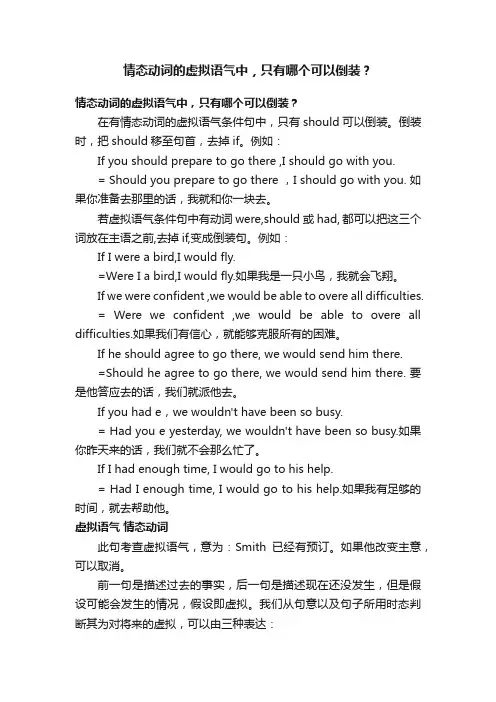
情态动词的虚拟语气中,只有哪个可以倒装?情态动词的虚拟语气中,只有哪个可以倒装?在有情态动词的虚拟语气条件句中,只有should可以倒装。
倒装时,把should移至句首,去掉if。
例如:If you should prepare to go there ,I should go with you.= Should you prepare to go there ,I should go with you. 如果你准备去那里的话,我就和你一块去。
若虚拟语气条件句中有动词were,should或had, 都可以把这三个词放在主语之前,去掉if,变成倒装句。
例如:If I were a bird,I would fly.=Were I a bird,I would fly.如果我是一只小鸟,我就会飞翔。
If we were confident ,we would be able to overe all difficulties.= Were we confident ,we would be able to overe all difficulties.如果我们有信心,就能够克服所有的困难。
If he should agree to go there, we would send him there.=Should he agree to go there, we would send him there. 要是他答应去的话,我们就派他去。
If you had e,we wouldn't have been so busy.= Had you e yesterday, we wouldn't have been so busy.如果你昨天来的话,我们就不会那么忙了。
If I had enough time, I would go to his help.= Had I enough time, I would go to his help.如果我有足够的时间,就去帮助他。

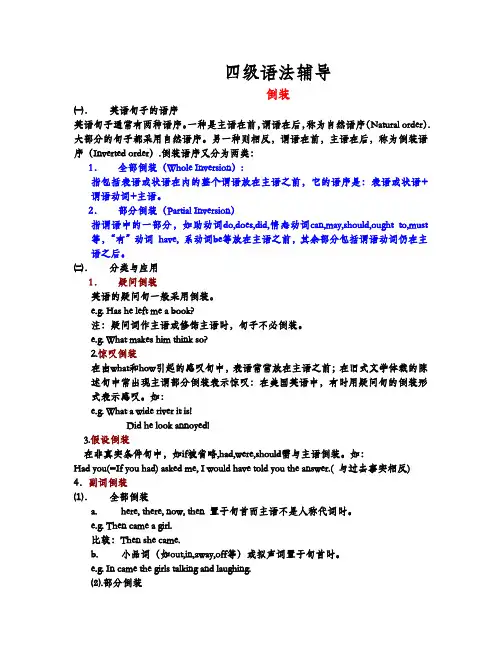
四级语法辅导倒装㈠.英语句子的语序英语句子通常有两种语序。
一种是主语在前,谓语在后,称为自然语序(Natural order).大部分的句子都采用自然语序。
另一种则相反,谓语在前,主语在后,称为倒装语序(Inverted order).倒装语序又分为两类:1.全部倒装(Whole Inversion):指包括表语或状语在内的整个谓语放在主语之前,它的语序是:表语或状语+谓语动词+主语。
2.部分倒装(Partial Inversion)指谓语中的一部分,如助动词do,does,did,情态动词can,may,should,ought to,must 等,“有”动词have, 系动词be等放在主语之前,其余部分包括谓语动词仍在主语之后。
㈡.分类与应用1.疑问倒装英语的疑问句一般采用倒装。
e.g. Has he left me a book?注:疑问词作主语或修饰主语时,句子不必倒装。
e.g. What makes him think so?2.惊叹倒装在由what和how引起的感叹句中,表语常常放在主语之前;在旧式文学体裁的陈述句中常出现主谓部分倒装表示惊叹:在美国英语中,有时用疑问句的倒装形式表示感叹。
如:e.g. What a wide river it is!Did he look annoyed!3.假设倒装在非真实条件句中,如if被省略,had,were,should需与主语倒装。
如:Had you(=If you had) asked me, I would have told you the answer.( 与过去事实相反) 4.副词倒装⑴.全部倒装a. here, there, now, then 置于句首而主语不是人称代词时。
e.g. Then came a girl.比较:Then she came.b. 小品词(如out,in,away,off等)或拟声词置于句首时。
e.g. In came the girls talking and laughing.⑵.部分倒装a. 方式副词或often, many a time频度副词置于句首时。
虚拟语气、倒装句型虚拟语气虚拟语气是通过特殊的谓语动词形式来表达的愿望、假设、怀疑、猜测或建议等语气,它不表示客观存在。
一、虚拟语气在单句中的用法常用来表示祝愿、采用固定的倒装句式。
例如:Long live the People ⨯s Republic of China!中华人民共和国万岁!be happy! 快乐!have a good time! 玩得愉快! succeed! 成功!make progress! 进步!二、虚拟语气在复合句中的用法:1. 在非真实性条件句与主句中的用法1) 表示与现在事实相反如果我是你,我会接受邀请的。
If I had time,I would go there.如果我有空,我就去那儿。
2) 与过去事实相反例如:If you had come earlier,you couldn ⨯t/wouldn ⨯t have missed the bus.如果你早点来,你就不会错过那辆公共汽车了。
If he had seen you yesterday,he would have returned your book.如果他昨天见到了你,他就会还你的书的。
3) 与将来事实可能相反例如:If it should rain/were to rain/rained tomorrow,the sports meet would be put off.万一明天下雨,运动会就推迟。
(事实上明天下雨的可能性不大。
)If you dropped/should drop/were to drop the glass,it would break.万一杯子掉下来会打碎的。
4) i f 的省略如果条件句中有were,had,should 等助动词,可将if 省略,而把were,had 或should置于句首,来表达以if 引导的条件句的相同意思。
例如:Should it rain/were it to rain tomorrow,the sports meet would be put off./Had he seen May you 祝你you yesterday,he would have returned your book.5)条件句或主句的省略当有上下文或上下句中的语言环境暗示的时候,表示虚拟语气的从句或主句往往可以省略,以避免重复。
虚拟语气与倒装句(教师版)什么就是虚拟语气(subjunctive mood)?If I were you, I would not do like this、要我就是您,我就不会这样做I wish I became a millionaire、要就是我就是个百万富翁多好啊口头解释上面两个例句后引出虚拟语气的概念表示说的话不就是真实发生,只就是一种假设,主观愿望,猜测,建议等非真实的情况。
今天主要讲在条件句中虚拟语气的使用情况Q: 那就是不就是所有的条件句都用虚拟语气?这里可以提问同学,进行互动后给出正确答案一.分类1、真实条件句,表示的假设就是有可能发生的,此时主句不用虚拟语气。
e、g、If I have time, I will do the homework、(口头解释分析这个句子)2、虚拟条件句,表示的就是一种假象,与事实相反或不太可能会发生,那就要用虚拟语气e、g、If I were you, I would do the homework、(口头解释分析这个句子)二.用法总结:从句都往过去推一个时态。
与现在相反--过去, 与过去相反--过去的过去(过去完成),与将来相反--过去三.重点解析1、l would/should/could/might主句谓语中的should主要用于第一人称后;would 表示结果还表示过去常常做某事,might表示可能性,could表示能力、允许或可能性。
比较: ①If you tried again,you would succeed、要就是您再试一试,您就会成功的。
(would表结果)②If you tried again, you might succeed、要就是您再试一试,您可能会成功的。
(might表可能)③If you tried again ,you could succeed、要就是您再试一试,您就能成功了。
(could表能力)2.错综时间虚拟条件句:即条件从句与主句所指时间不一致,如从句指过去,而主句即指的就是现在或将来,此时应根据具体的语境情况,结合上面提到的三种基本类型对时态作相应的调整If it had rained last night, the ground would be wet now、要就是昨晚下过雨的话,现在地面就会就是湿的。
虚拟语气一.条件句虚拟if 条件句1.与现在相反从句主句did/were 3d/m+v (should could would+might)2.与过去相反had done 3d/m+have done3.与将来相反were to /should do/did 3d/m+v二.省略if 提前should/were/had三.交叉虚拟从句过去相反主句现在相反if you had followed my advice, you should be all right now 四.隐含条件虚拟without ,but for, or , otherwise, without / but for your help ,I would not have won the first place五.从句中的虚拟表达人主观意愿的词+(should)+v 建议:advice suppose propose recommend要求:require request demand命令:order安排:arrangeI suggest he (should )get up earlymy suggestion is that...should +doIt is suggested...should +do六.其他虚拟wish / if only / would rather 用过去时表示与现在或将来相反用过去完成时表示与过去相反I would rather that he did not say anythingIt is about / high time that you went to school If only I had followed your advice倒装全倒谓语+ 主语1.表示地点的短语放在句首across the street, stands a tall building among the gates , stands Mary2.表示地点时间方位的副词在句首in out here there awayhere comes the car半倒半倒条件+助动词+主语+ 动词半倒条件+ be + 主语+ 其他1.only +状语放在句首only by taking effective steps, can we solve the issue only then did i realize the importance of English2.表示否定意义的副词放在句首no , not only ,not until ,by no means ,hardly , seldom,littleLittle do we know about himNever have I been to the Great WallNot until he came back did i know about itNo sooner had he got home than he began to prepare supperNeither have i gone abroad ,nor will i have a chance in future3 so,neither, nor +助动词+主语表示也........... so do I neither do i。
第一类If虚拟条件句分三种时态:与现在事实相反、与过去事实相反、与将来事实相反。
*条件句有真实条件句和非真实(虚拟)条件句两种。
真实条件句的假设是有可能发生的,而非真实条件句的假想与事实相反或不大可能会发生,试比较:If I have time, I will go with them. 假若我有时间,我就同他们去。
(陈述语气)If I had time, I would go with them. 假若我有时间,我就同他们去。
(虚拟语气)这是对现在事实的虚拟,事实是我没有时间,所以我没有和他们去If条件句虚拟1、l would/should/could/might 主句谓语中的should主要用于第一人称后;would表示结果还表示过去经常常常做某事,might表示可能性,could表示能力、允许或可能性。
比较:If you tried again ,you would succeed. 要是你再试一试,你就会成功的。
(would表结果) If you tried again,you might succeed. 要是你再试一试,你可能会成功的。
(might表可能) If you tried again ,you could succeed. 要是你再试一试,你就能成功了。
(could表能力)2、错综时间虚拟条件句即条件从句与主句所指时间不一致,如从句指过去,而主句即指的是现在或将来,此时应根据具体的语境情况,结合上面提到的三种基本类型对时态作相应的调整:If it had rained last night, the ground would be wet now. 要是昨晚下过雨的话,现在地面就会是湿的。
You would be much better now if you had taken my advice. 假若你当时听我的话,你现在就会好多了。
3、If虚拟条件句的否定(含蓄条件句)常考两个句型:If it weren’t for…和If it hadn’t been for…,其意为“若不是(有)” “要不是”。
虚拟语气倒装当虚拟条件句中含有were, had, should, could等动词时,可以将if省略,然后将had, should,could等词移至句首:1) If he should fail,he would kill himself.T Should he fail , he would kill himself.万一失败,他就会自杀。
2) If I were you , I would do it at once.T Were I you , I would do it at once.假若我是你,我就会马上做。
3) If I could do it , I would.T Could I do it , I would.要是我能做此事,我一定会做。
4) If he had seen you yesterday, he would have asked you about it.T Had he seen you yesterday, he would have asked you about it.他昨天要是看到了你,他就会问你这事了。
再看一些例句:1) Were they here now, they could help us.=If they were here now, they could help us.他们现在在的话,就会帮助我们了。
2) Had you come earlier, you would have met him.=If you had come earlier, you would have met him.你来得早一点,就碰到他了。
3) Should it rain, the crops would be saved.=Were it to rain, the crops would be saved.假如下雨,庄稼就有救了。
4) Were I (= If I were ) in your place , I wouldn 'do it.5) Had you (= If you had ) seen it, you would have believed .6) Were they to get married ( = If they were to get married ), the would not be happy .7) Should he come, tell him to ring me up.他要是来了,让他给我打个电话。
当虚拟条件句中含有were,had,should,could等动词时,可以将if省略,然后将we re,had,should,could 等词移至句首:
1.If he should fail,he would kill himself.
→Should he fail,he would kill himself.
万一失败,他就会自杀。
2.If I were you,I would do it at once.
→Were I you,I would do it at once.
假若我是你,我就会马上做。
3.If I could do it,I would.
→Could I do it,I would.
要是我能做此事,我一定会做。
4.If he had seen you yesterday,he would haveasked you about it.
→Had he seen you yesterday,he would haveasked you about it.
他昨天要是看到了你,他就会问你这事了。
顺便说一句,以上移至句首的had不一定是助动词,如果是实义动词也可倒装:
If he had money,he would buy a car.
→Had he money,he would buy a car.
他要是有钱,他就会买一辆小车。